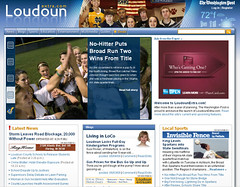Getting it Backwards (#2)
Speaking of the Washington Post, our friends at Washington City Paper have a cover story proposing how the Post can deal with the massive decline in paid-copy circulation (I won't say readership) and the rise of Internet-based information delivery, and the thing that they don't mention, the massive consolidation of businesses including department stores, banks, supermarkets, car dealerships, stock brokerages, and other retail, which has decimated their ability to sell advertising. See "This Bag Is Too Heavy: How to Downsize the Washington Post."
Note that (1) the Christian Science Monitor is going to cease publishing a print edition; (2) the Portland Press-Herald has threatened this and has cut back massively the number of journalists and beats covered, i.e., dropping a DC journalist reporting on the Maine congressional delegation; (3) the Tribune Company (Chicago Tribune, LA Times, Newsday, Baltimore Sun, Orlando Sentinel, Ft. Lauderdale Sun-Sentinel and others) is in bankruptcy; and (4) tomorrow the Detroit Free Press and Detroit News are going to announce massive reductions in circulation, perhaps only delivering the newspaper to households 2 or 3 days/week!
Meanwhile, newspapers in London, UK have moved to a free distribution model and to the tabloid format away from the broadsheet format, which is an extension of the idea of how the Examiner and Express are delivered in the DC region, but the advertising base is stronger in London. (Long story about this, as well as the rise of free distribution daily papers in the U.S., that isn't fully relevant to this blog... but you can ask me about it sometime if you meet me in person.)
But the City Paper didn't make the one of the better suggestions it could have made, a piece of which I have been pushing for awhile, which is based on the importance of local news coverage, and building readership within younger segments (note that speaking of younger segments, National Public Radio has announced that it is dropping radio programs created to attract new, younger audiences to its services)...
1. I have been suggesting for years that rather than reduce the amount of news and editorial coverage in the weekly sections of the Post (such as District Extra) expand it, and not just on the Internet, as was done on a test basis with the Loudoun edition.

Enhanced online version of the Loudoun Extra.
2. AND DISTRIBUTE MANY ADDITIONAL COPIES OF THIS SECTION FREE, JUST LIKE THE CITY PAPER, THROUGHOUT THEIR SERVICE AREAS.
3. But now I would make an additional suggestion, which could destroy the City Paper... The Post should do this in combination with an expanded Weekend Section, including more local content for each county, more local advertising sold at a reduced rate, as well as slightly expanded regional content, combine this with the Weekly section, and deliver to subscribers an expanded Extra Section + Weekend Section on Thursdays, including a fair amount of free distribution of this section, just like the Examiner does, delivering their newspaper to highly coveted readers (based on household income) as well as free distribution at subway stations and other locations.
I love newspapers and read many (Post, NYT, Financial Times, Wall Street Journal, Washington Times, Baltimore Sun). And I prefer print to digital. (It's a faster way to read.) Newspapers are essential to civic action and shedding light on local issues. In that vein, the Washington City Paper is an important media vehicle too, I just don't know what to suggest for them. (They are also in bankruptcy.)
Labels: civic engagement, media



0 Comments:
Post a Comment
<< Home